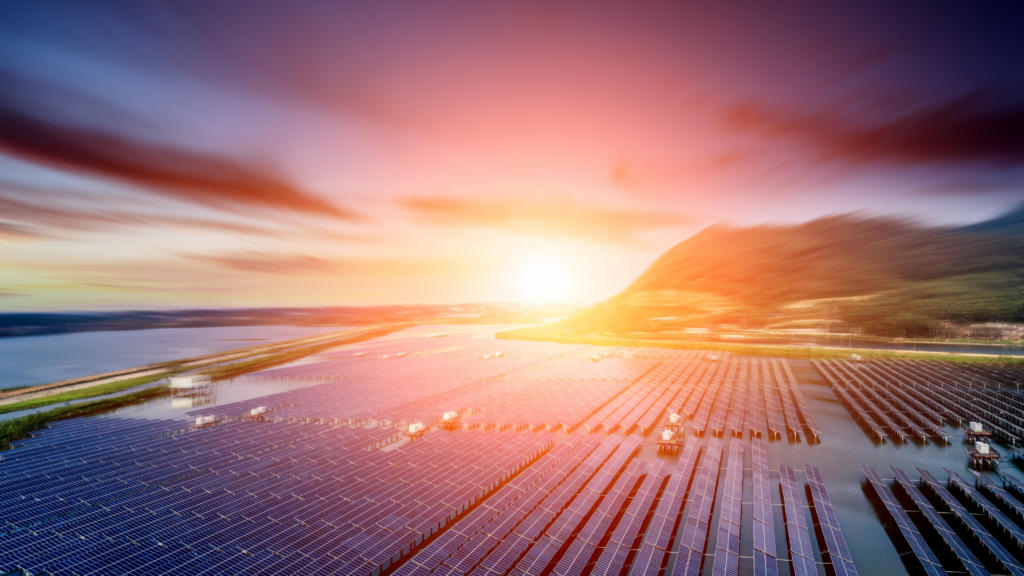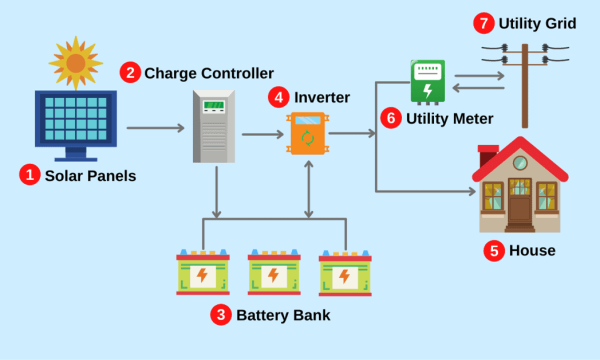Sales Number: (727) 205-4866
Customer Service Number: (800) 351-3430
Ever wondered how a bunch of black panels on a rooftop can power a home or business? Curious about how solar panels and solar energy systems merge to lower your utility costs each month? Well, you’re in the right place.
In simplest terms, it’s the energy that is projected from the sun to the Earth. Because the sun is a natural nuclear reactor it holds a lot of energy and is released in small bundles of energy called photons. These photons travel across the vacuum of space and reach Earth in about 8 minutes and 20 seconds. This means that in just a 60 minute period the amount of energy coming from the sun can power the entire globe for more than a year!

Photons from the sun knock loose the electrons from their atoms and with conductors it forms an electrical circuit. This flow of electrons subsequently generates electricity that can power your home or business. With every new solar panel that is added to a home, the capacity for energy production increases.
It’s important to find an energy that works for you, and determining if solar energy will fit into your daily lifestyle is a priority. The advantages of powering your home with solar energy are many, but we’ve narrowed the list down to the most important. Here are some advantages to switching your home or business to solar power.
Reducing the monthly electric bill is a priority in most homes. When you generate your own energy through the power of the sun it reduces your electric bill. Not only does solar power save money, but it can help you earn more. Some solar energy systems are candidates for state-level incentives, rebates, and federal tax credits. Because you’re choosing a safer, greener electricity option, the government will reward you with a tax cut helping you save money on installation.
Solar has far fewer carbon emissions than the standard forms of non-green energy that heavily rely on fossil fuels. Greenhouse gas emissions are insignificant because solar power uses no fuel combustion. Each kilowatt-hour (kWh) of renewable energy substantially reduces greenhouse gas emissions like CO2 and other dangerous pollutants such as sulfur oxides, nitrogen oxides, and particulate matter. The more people who choose to go solar, the cleaner our air will be.
Going solar could be a stable resource for billions of years. It’s the most abundant energy resource on earth—173,000 terawatts of solar energy strikes the Earth continuously. That’s more than 10,000 times the world’s total energy use.
Limited resources like fossil fuels will one day run out and cannot be replaced, but the sun will keep on shining for another 5 billion years or so. Remaining independent will allow our renewable resources to grow as technology further develops and we find more ways to incorporate renewable energy into everyday life.
Most solar energy systems come with a very extended warranty—sometimes up to 25 years. Maintenance usually only requires an annual cleaning. Solar PV and solar thermal parts will need to be changed out about every 10 years. There are no moving parts, so there’s less that could break down or go wrong. Since solar energy systems are easy to maintain, you won’t have to spend too many repairs. This also makes solar energy systems an attractive choice for people who might not be able to fix or maintain household appliances.
Because solar power puts less burden on the electric grid, some U.S. states offer net metering policies. Net metering policies allow those who generate solar power to sell excess electricity to a utility at a retail rate and receive credit on their utility bill. This credit offsets the customer’s electricity consumption during other times of the day or year, which reduces the amount of electricity you need to source (and pay for) from a utility.
Other than the obvious purpose of harnessing the sun’s energy to create renewable electricity, solar panels also serve to protect your roof. Solar panels form a protective barrier between your roof and the outside elements. Having solar panels on your roof can help protect it from mother nature’s wrath. Outdoor elements such as wind, rain, snow, and the occasional falling tree are prevented from directly hitting your roof and causing damage.
Solar panels also absorb direct sunlight that would otherwise fall directly on your roof. The gap between panels and roof forms an air pocket that has a cooling effect on your roof. One study shows that installing solar panels can decrease a home’s internal temperature by up to 5 degrees.
Given this information, solar panels can actually protect your roof from a number of potential damages. Additionally, homes located in an area known for harsh weather conditions will weather any storm thrown their way.
Although there are many reasons to make the switch to an eco-friendly, renewable energy option, solar energy isn’t the best for everyone. While we believe solar energy has the power to transform our world, we realize it’s not perfect. We want to discuss a few of the important cons to consider.
Investing in home solar panels is a bit like buying a car. Rooftop solar panels are a sizable investment. But, if you do your research, test drive a few, and make a smart and informed decision, your investment will provide great returns for many years.
However, for some, the end result might not be worth the investment of time and money, which is totally understandable. Even with the reduced 26% investment tax credit (ITC) credit, the average price a solar installer will charge for a 10 kWh system in 2021 is about $20,000.
This is why we offer a solar energy program finder. It’s quick and simple. All you have to do is enter some information (nothing private), and we will determine if your home qualifies for a solar program. There is no initial downpayment when using these programs. Making it easy on you and your wallet.
“Thanks, Captain Obvious!” But seriously, you have to consider the reality that your rooftop solar panels won’t create electricity at night. Yes, a tiny fraction of sunlight is reflected off of the moon and absorbed into the solar panels, but it’s essentially pitch black at night. And when there’s no light, solar panels don’t produce electricity.
Solar energy relies on utility grids to generate power at night when the sun isn’t out. Some solar panel systems have an optional battery backup but not all are available with this option. So when the sun isn’t out, you’ll have to rely on the energy grid like everyone else.
If you don’t use your solar energy immediately, it will have to be stored on batteries, which can be both costly and space consuming. These batteries charge during the day so that you have energy to use at night.
The reason why solar storage and energy storage in general is so expensive is that it’s uncharted territory. In 2010, you would have paid $40,000 for an average residential solar system, whereas today—the price is half that. We’re optimistic that 10 years from now, solar storage along with the panels themselves will cost even less than they are today.
This is why most rooftop solar owners currently opt for a net metering setup. With this arrangement, your retail electricity provider agrees to buy excess solar power off your hands. Duke Energy and TECO Energy happens to be one of those providers! During peak generating hours, the excess solar energy you generate and don’t use is added to the grid. In turn, your electricity company will pay you for the energy you supplement to your local area.

As energy customers turn towards more renewable and green energy options, it’s important to differentiate their pros and cons. Before committing to a newer, greener energy source, try to establish a budget that would be affordable to you and your family. Make a list of pros and cons that are personalized to you and your family specifically, so that you can better understand what options are more beneficial to you over others.